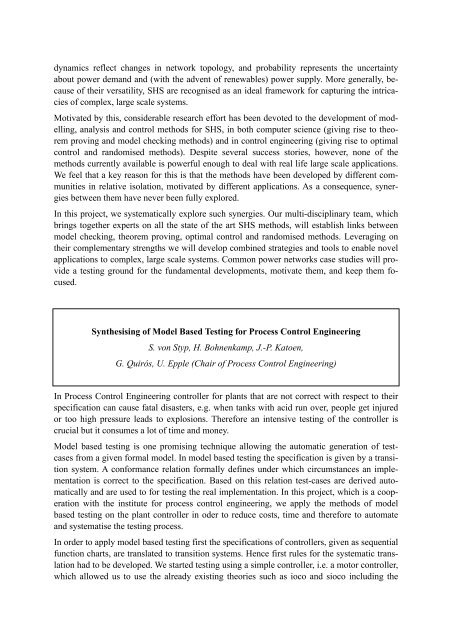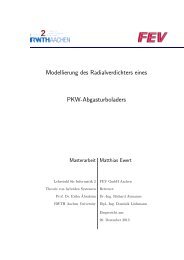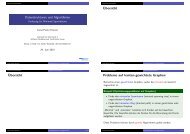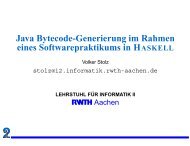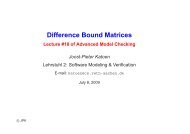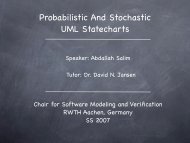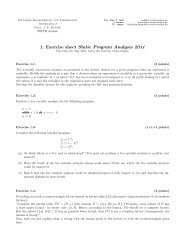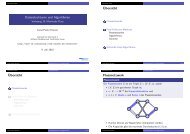Research Projects - Software Modeling and Verification - RWTH ...
Research Projects - Software Modeling and Verification - RWTH ...
Research Projects - Software Modeling and Verification - RWTH ...
Create successful ePaper yourself
Turn your PDF publications into a flip-book with our unique Google optimized e-Paper software.
dynamics reflect changes in network topology, <strong>and</strong> probability represents the uncertainty<br />
about power dem<strong>and</strong> <strong>and</strong> (with the advent of renewables) power supply. More generally, because<br />
of their versatility, SHS are recognised as an ideal framework for capturing the intricacies<br />
of complex, large scale systems.<br />
Motivated by this, considerable research effort has been devoted to the development of modelling,<br />
analysis <strong>and</strong> control methods for SHS, in both computer science (giving rise to theorem<br />
proving <strong>and</strong> model checking methods) <strong>and</strong> in control engineering (giving rise to optimal<br />
control <strong>and</strong> r<strong>and</strong>omised methods). Despite several success stories, however, none of the<br />
methods currently available is powerful enough to deal with real life large scale applications.<br />
We feel that a key reason for this is that the methods have been developed by different communities<br />
in relative isolation, motivated by different applications. As a consequence, synergies<br />
between them have never been fully explored.<br />
In this project, we systematically explore such synergies. Our multi-disciplinary team, which<br />
brings together experts on all the state of the art SHS methods, will establish links between<br />
model checking, theorem proving, optimal control <strong>and</strong> r<strong>and</strong>omised methods. Leveraging on<br />
their complementary strengths we will develop combined strategies <strong>and</strong> tools to enable novel<br />
applications to complex, large scale systems. Common power networks case studies will provide<br />
a testing ground for the fundamental developments, motivate them, <strong>and</strong> keep them focused.<br />
Synthesising of Model Based Testing for Process Control Engineering<br />
S. von Styp, H. Bohnenkamp, J.-P. Katoen,<br />
G. Quirós, U. Epple (Chair of Process Control Engineering)<br />
In Process Control Engineering controller for plants that are not correct with respect to their<br />
specification can cause fatal disasters, e.g. when tanks with acid run over, people get injured<br />
or too high pressure leads to explosions. Therefore an intensive testing of the controller is<br />
crucial but it consumes a lot of time <strong>and</strong> money.<br />
Model based testing is one promising technique allowing the automatic generation of testcases<br />
from a given formal model. In model based testing the specification is given by a transition<br />
system. A conformance relation formally defines under which circumstances an implementation<br />
is correct to the specification. Based on this relation test-cases are derived automatically<br />
<strong>and</strong> are used to for testing the real implementation. In this project, which is a cooperation<br />
with the institute for process control engineering, we apply the methods of model<br />
based testing on the plant controller in oder to reduce costs, time <strong>and</strong> therefore to automate<br />
<strong>and</strong> systematise the testing process.<br />
In order to apply model based testing first the specifications of controllers, given as sequential<br />
function charts, are translated to transition systems. Hence first rules for the systematic translation<br />
had to be developed. We started testing using a simple controller, i.e. a motor controller,<br />
which allowed us to use the already existing theories such as ioco <strong>and</strong> sioco including the


